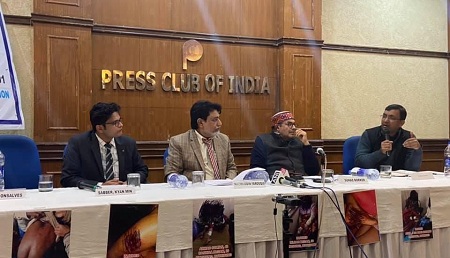
The COVID-19 pandemic and subsequent containment measures are undertaken by the Indian
The government has had a severe impact on Rohingya refugees in India.
Most Rohingya families are unable to cover their basic needs due to disruptions to their livelihoods. As “illegal migrants”1, they do not have access to social protection programs or other assistance offered by the government. Many families are unable to feed themselves and there are increasing reports of malnourishment in the community.
The intersectional discrimination that the Rohingya community faces in India on account of being refugees and Muslims has been exacerbated by the pandemic. Most significantly, the right-wing Indian media has been baselessly villainizing the Rohingya as deliberately spreading covid-19 within the country.
While there is a general understanding of COVID-19 and social distancing in the Rohingya community, there are also high levels of misinformation which has impacted their ability to take appropriate precautions.
Fears of being discriminated against or even attacked are preventing Rohingya refugees with
Ailments, including COVID-19 related symptoms, from accessing health facilities.
Children of school-going age are housebound and unable to access education during the lockdown. Lack of ICT equipment limits their access to online education options.
There are also reports of intimate partner violence, gender-based violence, and violence against children in households.
UNHCR, its implementing partners, and other NGOs are aiding Rohingyas in their main areas of operation2. However, the issues are particularly pronounced in other locations with smaller concentrations of Rohingyas which have limited to no access to relief, support, and communication initiatives.
The project aims to set up protection monitoring mechanisms in Rohingya settlements in India to assess problems such as the spread of COVID-19. The information in this report is generated for sharing with key stakeholders to strengthen their responses and allocate available resources.
Demographic Information:
56 Rohingyas participated in this study. They belonged to Meerut (5), Mathura (17), Ghaziabad (7), Saharanpur (11), and Bangalore (16). The mean of the participants was 34 years.
53% of participants were male and 47% were female. 87% of the participants were married, 11% were single and 2% were widowed. 96% of the participants had children. All participants were from Myanmar and were Muslim.
1 The official status of Rohingya refugees as per the Government of India.
2 Main locations of operation include Jammu (Jammu & Kashmir), Hyderabad (Telangana), Nuh (Haryana) and
Delhi where the largest numbers of Rohingya reside.
1. Living Conditions:
 CREDITS: YU KYUNG LEE (JOURNALIST AND R4R
CREDITS: YU KYUNG LEE (JOURNALIST AND R4R
Here the link: HTTPS://WWW.ROHRINGYA.ORG/REPORT_PDF/B6F94AD56EFE34F8F62A12EB28C315D6.PDF
